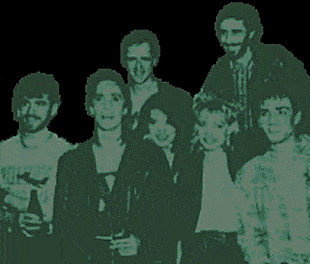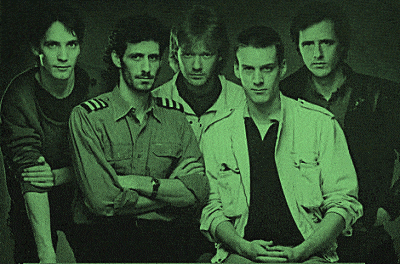 Pisapia needed an outlet for the new material, so in 1982 formed Checkpoint Charlie with guitarist Guy Florent and Jean-Pierre Brie on bass. It was around the same time a chance encounter with Marc Durand, who’d produced MWH’s debut smash earlier that year that their fortunes would turn. The band changed their name to The Box in time to win CFOI Montreal’s ‘homegrown’ contest in the spring of 1983. Durand at the time was setting up his own record company, Alert Records. Following the ‘Boxmania’ that was starting to take over the Montreal club scene, they were the first band to sign with the new company. They hired Pisapia’s younger brother Guy to take over the keyboards-duties, allowing Jean Marc to concentrate on vocals . Durand took the group into the Montreal studios – the sessions becoming The Box’s self-titled debut in the spring of ’84. The new-wave power of the first single “Walk Away”, hit the airwaves that spring and critics and station managers alike took notice. But it was the second single “Must I Always Remember” that broke the band nationwide. Backed by the support of the video’s frequent rotation on MuchMusic, the album shot up the charts, hitting the 10,000 mark by the end of the year. Their electronic power pop sound was as refreshing on the airwaves as it was diverse. The inclusion of “Quand Le Roy” insured a strong sales base in their home province, staying on top of the Quebec charts for four weeks. Backed by the support of the all-out party-hardy “Weekend”, “Dancing On The Grave” and the social commentary of “Live On TV” and “War Going On”, the album was considered by many to be one of the best of the year. They added Sylvain Coutu to replace the drum machine on the ensuring tour, which also gave Canada it’s first look at a young Sass Jordan, who would later lead to a very successful solo career. The band’s live show was quickly gaining attention across the country but the end of the tour saw Florent and Coutu leave the band. Florent’s guitar duties were taken over by Claude Thibeault, while Phillipe Bernard was brought in on drums for the second lp, 1985’s ALL THE TIME. Produced again by Durand, the album showed an instant maturity, with the first single “My Dreams Of You” quickly going gold. Again the band enjoyed hitting the top of the Quebec charts, scoring big and winning several provincial and national awards with “L’Affaire Dumoutier”. The French hit’s ‘b’ side “Remnants”, the socially-flavoured “With All This Cash” and “Evil In Me” all exemplified their melding of new age electronics and radio friendly power pop. CLOSER TOGETHER hit the stands in the summer of ’87, with Durand again overseeing production. Going back to a more streamlined approach, it dropped the 2 women on backup vocals and utilized less post-production. It was also their first record not to include a bilingual track. The lead single “Ordinary People” quickly became a nationwide hit, a power-driven refined song with the ‘Why can’t we all just get along?’ theme, whose message was helped by a masterful video presence on MuchMusic. After going gold while reaching the Top 10 in Canada. it was followed by the title track shortly after. The Third single “Crying Out Loud For Love” was released in the spring of ’88 and showed their leaning more to the international market, radio rock with a new wave flare. It helped make it their first platinum album (100,000 units Canada-wide). But despite the growing album sales and rave live reviews that included a European tour, The Box was still hidden in the attic. The band recorded outside Quebec for the first time when they went to England to work on the next album. “PLEASURE AND PAIN” marked the departure of Durand behind the controls for the first time. The new producer was Mark Rushent, who’d enjoyed success working with rock’s new wave with The Go Go’s and The Human League. Released in 1989, it struck gold with “Carry On”. Two other singles were released, “Temptation” and “Inside My Heart”. But again, despite now four gold records, true international success was still eluding them. Frustrated with the direction the band was going, Jean Marc Pisapio quit the band, which led to its demise, after the following tour that extended into the new year. He returned to Alert in 1995 for his solo album, JOHN OF MARK.
|


